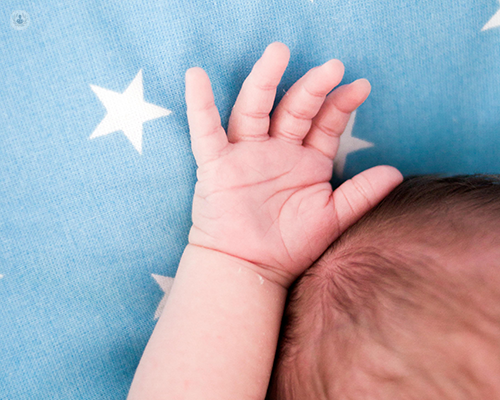Fertility and the menopause: Part 1
Autore:
Fertility and the menopause represent significant and intricate aspects of a woman's reproductive journey, each marking distinct phases in her life.
Mr Laxmikant Chaudhari is a renowned consultant gynaecologist who specialises in fertility investigations and the menopause.
In the first of two articles on fertility and the menopause, Mr Chaudhari offers an expert insight into the symptoms of approaching menopause, how age impacts a woman’s fertility, and the success rate of fertility treatments.

What are the signs and symptoms of approaching menopause, and how can they be managed?
Approaching menopause, also known as the perimenopause, is the transitional period before the menopause when a woman’s body undergoes hormonal changes. Signs and symptoms can vary, but common ones include:
- Irregular menstrual cycles: Menstrual cycles may become irregular, with changes in the duration and intensity of periods.
- Hot flashes and night sweats: Episodes of sudden and intense heat, often accompanied by sweating, may occur especially at night.
- Sleep disturbances: Alterations in sleep patterns, including difficulty falling asleep or staying asleep, may occur.
- Mood swings: Hormonal changes can give rise to mood swings, irritability, and heightened susceptibility to stress.
Additionally:
- Vaginal dryness: Reduced oestrogen levels can lead to vaginal dryness, causing dyspareunia (discomfort during intercourse).
- Changes in libido: Some women may experience changes in sexual desire or responsiveness.
- Fatigue: Increased fatigue and reduced energy levels may be experienced.
- Memory and concentration issues: Some women may experience difficulties with memory and concentration.
Perimenopausal symptoms can be managed in various ways. These may include:
- Hormone replacement therapy (HRT): Oestrogen and progesterone therapy can help manage symptoms, but there are potential risks involved. The use of HRT should therefore be discussed with a healthcare professional.
- Lifestyle changes: A healthy lifestyle, which includes regular exercise, a balanced diet, and stress management, can help manage symptoms.
- Dietary modifications: A diet rich in fruits, vegetables, and whole grains that also limits caffeine and alcohol intake is beneficial.
- Vaginal moisturisers and lubricants: Over-the-counter moisturisers and lubricants can offer relief for vaginal dryness.
- Mind-body techniques: Yoga, meditation, and deep breathing exercises can help reduce stress and improve mental wellbeing.
- Medications: Selective serotonin reuptake inhibitors (SSRIs) can be prescribed to help manage hot flashes and mood swings.
Women who are experiencing symptoms of the perimenopause should consult with a healthcare professional to determine a tailored treatment plan based on their individual health needs and preferences.
Can fertility treatments be effective for women in their late 30s or early 40s who are trying to conceive?
While fertility treatments can be successful for women in their late 30s or early 40s, success rates tend to decline with age. This is because both the quantity and quality of eggs decrease as women age, presenting challenges for conception.
However, there are various fertility treatments that can help improve the chances of pregnancy. These include:
- In vitro fertilisation (IVF): IVF involves fertilising an egg with sperm outside the body before implanting the fertilised embryo into the uterus.
- Egg freezing: Egg freezing involves retrieving and freezing eggs for later use. Women who aren’t ready for conception but worry about declining fertility can consider egg freezing.
Factors like overall health, lifestyle, and underlying medical conditions can also influence the effectiveness of fertility treatments. Success rates can vary, and there are no guarantees, but many women in this age group are able to achieve successful pregnancies.
How does age impact female fertility, and what factors contribute to a decline in reproductive capacity?
Fertility in women tends to decline with age, and this decline becomes more noticeable as women reach their late 20s and early 30s. Various factors contribute to this decline in reproductive capacity, including:
- Changes in ovulation: As women age, the regularity and predictability of ovulation can decrease, resulting in irregular menstrual cycles. These can cause fewer opportunities for conception.
- Decline in egg quantity and quality: Women are born with a finite number of eggs, and this number decreases over time. Additionally, the quality of eggs may decrease with age, increasing the risk of chromosomal abnormalities and reducing the chances of successful fertilisation.
- Hormonal changes: Age-related hormonal changes, such as the decline in a woman’s ovarian reserve (the eggs available for fertilisation), can impact fertility. Fluctuations in hormone levels, such as oestrogen and progesterone, also affect the overall reproductive environment.
- Uterine changes: Over time, the uterus may undergo changes, affecting its ability to support a pregnancy. Uterine conditions like fibroids or endometriosis may also become more prevalent with age, impacting fertility.
Additionally:
- Increased risk of miscarriage: The risk of miscarriage increases with age, partly due to an increased likelihood of chromosomal abnormalities in eggs leading to failed implantation or early pregnancy loss.
- Decreased cervical mucus quality: Cervical mucus plays an important role in fertility by aiding sperm transport. Age-related changes can affect the quality and quantity of cervical mucus, making it more challenging for sperm to reach the egg.
- Reduced response to ovarian stimulation: In assisted reproductive technologies like IVF, older women may have a reduced response to ovarian stimulation medications, resulting in fewer eggs retrieved for fertilisation.
- Increased risk of health conditions: Age is often associated with an increased risk of health conditions that can impact fertility, such as diabetes, hypertension, and autoimmune disorders.
Individual variations exist, and not all woman will experience the same degree of fertility decline at the same age. However, understanding the impact of age on fertility can be helpful for women who are making family planning decisions.
Head on over to the second part of this series to find out about the lifestyle changes that can support fertility and the medical options available for both fertility and the menopause.
To schedule an appointment with Mr Laxmikant Chaudhari, head on over to his Top Doctors profile today.


